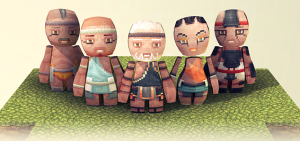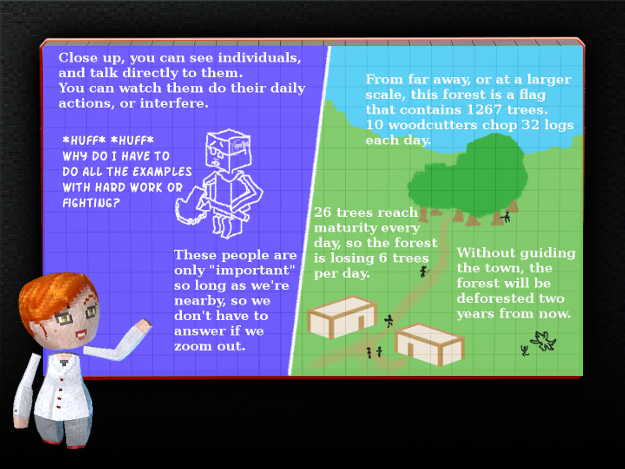
While previously, we touched on how scaling and abstraction works in military and towns, this time, we are going to go into the breadth of abstraction in this game. The ability to abstract out the simulation is key to making the simulated world work, and scaling perspectives is one of the core principles that distinguishes Imagine Nations from other sandbox games.
When the player’s away…
One of the most significant changes is that the game, functionally, “fudges the numbers” to make the math easier whenever the player isn’t nearby. A large city may have a thousand citizens, all with individual tasks and thoughts and agendas, but the game never runs all thousand people at once.
Most games that are player-focused simply don’t simulate the citizens at all when they aren’t in the player’s proximity, and since they make no lasting changes to the world outside of scripted plot events, it makes no difference. It’s just a matter of hardware limitations. So long as they are there when the player looks for them, that’s all that matters.
Imagine Nations, however, needs those “unimportant civilians” to do jobs that add up to important differences in the town: The woodcutters need to cut wood to make construction materials and furniture; The miners need to get the ores that the smiths use to make tools and weapons; The soldiers need to sweep out the monsters and keep lairs away from town. Each town tracks these things, even when players are not around.
That’s where abstraction comes in – the game uses flags for places like forests, and tracks how many trees are in the forest, as well as how many woodcutters are chopping down trees, but can boil this down to an abstract math problem: The woodcutters chop X number of trees per day. When the player isn’t around the town, or if the player isn’t in the right parts of town, then all that’s important is that the wood was chopped, (and how many woodcutters were eaten by sharkbears because there’s still that lair in the woods,) not what path the woodcutter took or which woodcutter was on break that day.
The Scale of the Problem

What this means to the player is that random low-level townspeople are typically “unimportant” characters, who don’t get the full simulation until and unless the player spends enough time with them or otherwise designates them “important” characters.
You can follow a random woodcutter from their house to the woods where they are chopping down trees and back again, and the game will follow the simulating every step of the way, but when gone, the routine is just a counter that says it’s X period of time to the next tree chopping.
Likewise, this is why individual soldiers become abstract followers of a commanding officer in the military, or citizens become just members of a faction or faceless workers to a mayor of a larger city: The unimportant characters are just attachments to the important ones that run things.
This scaling takes place at different stages, the further removed the player is. A larger city’s citizens might fold into their factions, where nothing but the leaders are important when the player is near that city, but a distant nation the player is only vaguely aware of may have all its factions folded up into cities, and those cities folded up into a single whole-nation actor. At the space stages, even whole planets are eventually treated as a single actor, when the player isn’t nearby.
It’s this ability to scale that lets you both follow a single woodcutter into the woods, and observe their everyday life, as well as have a global-level empire with a working economy at the same time. If you are gone long enough, you can easily return to a town long since destroyed by a calamity or conquered by a hostile neighbor. The game doesn’t wait for you to always save the day. Alternately, you might return from slaying the dragon in the distant dungeon, sword in hand, to find your town is now in the Information Age, and doesn’t respect swords anymore in favor of new-fangled firearms. Scaling, and its various levels of attention to detail let the choices you didn’t make matter, as well.
Nominal Importance
Players also play a role in determining which people are “important” or not. The player’s character’s spouse or children may not be mayor or leaders of a faction, but their individual growth, moods, and status are important, and needs to be tracked. The neighbor the player is close friends with and talks to every day is important, but the other neighbor you never really see isn’t important.
Important characters are characters the player knows and deals with frequently enough to notice when there is a change. (Or for a player to notice there isn’t a change when there should be one.) Importance is determined both by how powerful the character is, and how frequently the player interacts with them. Importance determines at what scales (how far away the player is, how many other characters are in the player’s area of influence,) important enough characters act individually, and when not important enough characters become abstracted. Important characters may well be more frequently the target of or instigator of events even when players are far away.
- Imagine Nations Team
Support the Imagine Nations Crowdfunding Campaign. Earn Backer’s Access and other rewards while helping us build this amazing game.


I am also really into the idea of the world going on around the player and NPCs living their lives etc. it makes it seem much more realistic.
The simulation will be an important aspect of the game.